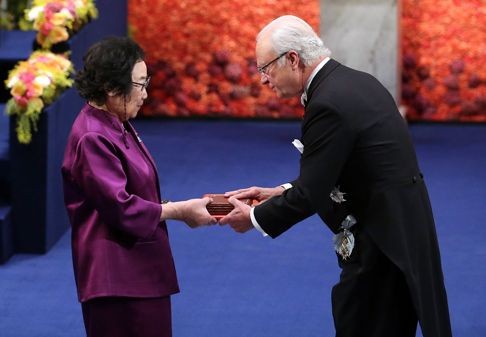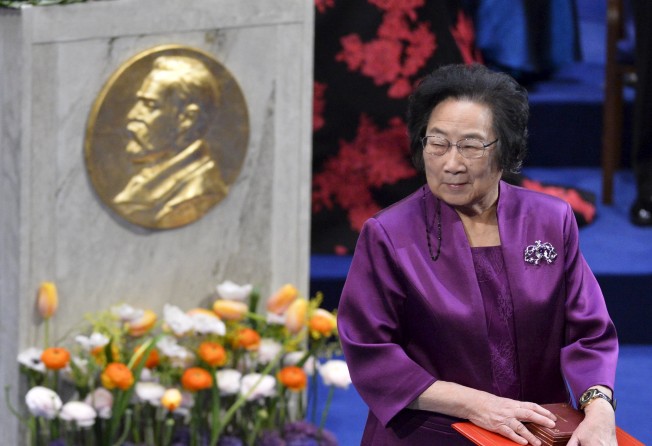
China’s Tu Youyou receives Nobel Prize for medicine at ceremony in Stockholm

The Chinese scientist Tu Youyou has received the Nobel Prize for medicine at a glittering ceremony in Stockholm.
Dressed to the nines in tails and long gowns, the 2015 Nobel laureates in literature, economics, physics and chemistry were also among those receiving their prizes on Thursday.
Ten laureates received Nobel diplomas and gold medals from Sweden's King Carl XVI Gustaf in a ceremony interspersed with classical music and presentations by the prize-awarding institutions.
Tu, William Campbell from the United States and Satoshi Omura from Japan received the medicine prize for unlocking revolutionary treatments for malaria and roundworm, helping to roll back two parasitic diseases that blight millions of lives.
Tu, 84, received the Nobel medal, Nobel diploma and a document confirming a cash award.
“The discovery of Artemisinin has led to development of a new drug that has saved the lives of millions of people, halving the mortality rate of malaria during the past 15 years,” said Professor Hans Forssberg, member of the Nobel Committee for Physiology or Medicine.
Tu and her team managed to extract a substance from Artemisia annua, or sweet wormwood, that proved effective in reducing mortality rates for patients suffering from malaria.

The other half was equally shared by Campbell and Omura, who jointly discovered a therapy against infections caused by roundworm parasites.
The ceremony took place in front of 1,600 invited guests at Stockholm's Concert Hall, decked out for the occasion with 20,000 white, yellow and orange flowers donated, as every year, by the Italian city of San Remo.
The discovery of Artemisinin has led to development of a new drug that has saved the lives of millions of people
The Swedish scientist and prize creator Alfred Nobel died there on December 10, 1896.
Takaaki Kajita from Japan and Arthur McDonald from Canada were awarded the physics prize for determining that neutrinos have mass, a key piece of the puzzle in understanding the cosmos.
The chemistry prize was presented to Sweden's Tomas Lindahl, Paul Modrich of the US and Aziz Sancar, a Turkish-American, for work on how cells repair damaged DNA.
Belarussian writer and dissident Svetlana Alexievich was given the literature prize for her work chronicling the horrors of war and life under the repressive Soviet regime.
Finally, poverty expert Angus Deaton, a US-British microeconomist, took home the economics prize for groundbreaking work using household surveys to show how consumers, particularly the poor, decide what to buy and how policymakers can help them.
The Nobel Peace Prize was presented earlier in the day to the Tunisian National Dialogue Quartet at a separate ceremony in Oslo.
The laureates later attended a gala banquet at Stockholm's City Hall attended by 1,300 people.